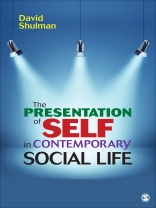The Presentation of Self in Contemporary Social Life covers the popular theories of Erving Goffman, and shows modern applications of dramaturgical analysis in a wide range of social contexts. David Shulman’s innovative new text demonstrates how Goffman’s ideas, first introduced in 1959, continue to inspire research into how we manage the impressions that others form about us. He synthesizes the work of contemporary scholars who use dramaturgical approaches from several disciplines, who recognize that many values, social norms, and laws have changed since Goffman’s time, and that contemporary society offers significant new forms of impression management that we can engage in and experience. After a general introduction to dramaturgical sociology, readers will see many examples of how Goffman’s ideas can provide powerful insights into familiar aspects of contemporary life, including business and the workplace, popular culture, the entertainment industry, and the digital world.
Innehållsförteckning
Introduction
Author′s Note
Chapter 1 Self-Presentation and The Dramaturgical Perspective
Introduction: “Being Yourself” Is a Performance Too
So Why Study Dramaturgy?
Getting Down to Business
The Scholarly Provenance of Dramaturgical Ideas
Analyzing Dramaturgy
Erving Goffman and Dramaturgy
Goffman’s Six Principles of Impression Management
The Self
Symbolic Interactionism
Chapter 2 Persona Watching: Catching Impression Management in Action
Introduction: Reverse Engineering Dramaturgy
Regions, Actors, Performances: Some Service Examples
Thinking of Performances as Cumulative: Social Order, Norms and Roles
Ratcheting Up Sociological Analysis with Dramaturgy
Chapter 3 Sociological Influences on People’s Performances
Introduction: Learning How to Act in Everyday Life
Social Structural Forces that Impact Dramaturgical Actions
Think of Social Forces as Interweaving Clusters
Realizing the Analytic Potential of the Dramaturgical Perspective
Nine Contributions A Dramaturgical Approach Can Make to Enhance Sociological Thinking
Chapter 4 Modern Life as Show Business
Introduction: The Thicket of Unreality
Examples of Unreal Images: Illusions, Photos and Word
Can You Detect Unreality?
Causes of Unreality: Extravagant Expectations and Pseudo-Events
Image Life as Performance
The Economics of Unreal Performances and Consumerism
Las Vegas Casinos as “Cathedrals of Consumption”
Consuming Experiences, Theming and Enchanted Products
Dramaturgy: The New Means of Consumption
Marketing and the Dramaturgical Legibility of Themes
Dramaturgical Inequalities: Gender, Goffman and Advertising
Conclusion
Chapter 5 Dramaturgical Involvements in Popular Culture
Introduction: Dramaturgical Involvement in Popular Culture
LARPS: Live-Action Role Playing
Engrossment in Popular Culture Experiences
Dramaturgical Residency
Face-to-Face Interaction
Surpassing Performance Limits in Fantasy or “Killing S**t” in Made-Up Worlds
Role Distance and the Actualization Gap
Frames: A Social Phoropter
Am Extended Case of Frames and Dramaturgy: The World of Professional Wrestling
The Horror Genre, Stigma and Frame Traps
Conclusion: Conflating Reality and Fantasy
Chapter 6 The Internet: Society’s Newest Stage
Introduction: The Internet, Disembodiment and Networked Audiences
The Collapsing of Front and Back Stage Contexts
Exploring Online Deviance
User Generated Content: Everyone’s a Star, Everyone’s a Critic and I’m Into Documenting My Life Onstage
Internet Ranting and Impression Management
Stigma and Cyberbullying
New Capacities to Stigmatize
Moral Entrepreneurs
Stigma Specialists Online: Mocking and Trolls
Performance Online Versus Offline
Altering Performance Content
Deceiving Others Online and Strategic Interaction
Deception in Online Dating and Romance
Virtual Role Engulfment
Filter Bubbles
Chapter 7 Workplaces as Stages
Introduction: Dramaturgy in Organizations and Workplaces
Performance Teams: Dramaturgical Circumspection, Discipline and Loyalty
Organizations and Order
The Dramaturgy of Meetings
Contemporary Takes on Dramaturgy in Organizations
The Interaction Order and the Negotiated Order
Asylums and Secondary Adjustments
The Dramaturgical Infrastructure
Total Institutions
Emotional Labor
Conclusion
Glossary
References












